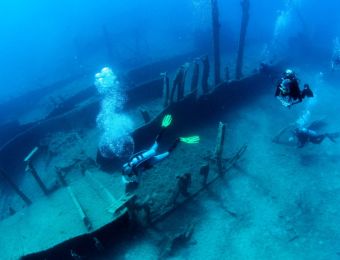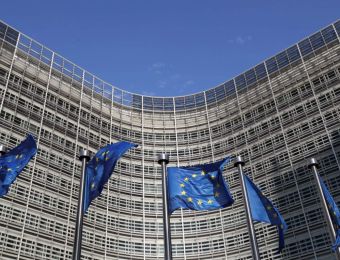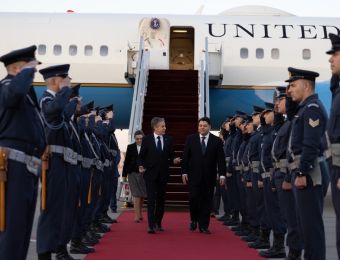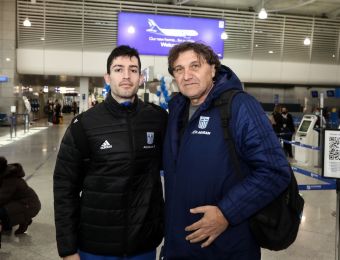Coronavirus: Advice for travelers to/from Greece

Πηγή: Sportime- OffLine Post
The National Health Care Organization EODY issued on new instructions for travelers traveling to and from Greece.
In a press release issued on 31. October 2022, EODY points out that the risk of transmission of the coronavirus varies, depending on the country of destination.
According to the announcement, people who belong to a high-risk group [in Greek; EODY May 12, 2022] are advised to take special care when traveling within and outside Greece due to the risk of serious illness and hospitalization.

EODY stresses that fully vaccinated travelers also need to follow the recommendations and requirements of the destination country regarding the measures in force to limit the Covid-19 infection.
EODY Advice for Travellers
Advice for travellers
The risk for travellers is considered moderate. It is recommended that travellers avoid nonessential travel to areas with presumed ongoing community transmission of COVID-19 (https://www.ecdc.europa.eu/en/areas-presumed-ongoing-community-transmission-2019-ncov). There is no vaccine against this novel corona virus [???].
People who belong to a high-risk group are advised to take special care when traveling within and outside Greece due to the risk of serious illness and hospitalization.
Apart from the need to faithfully apply personal protection measures (before, during and after travel) vaccination of the population is a particularly important measure to limit the transmission of the disease.
Fully vaccinated travelers also need to follow the recommendations and requirements of the destination country regarding the measures in force to limit the Covid-19 infection.
If you are travelling to areas with presumed ongoing community transmission of COVID-19 you should:
- Wash your hands regularly with soap and water or a disinfectant, especially after coughing or sneezing, before handling and consuming food.
- Avoid contact with animals (dead or alive), meat markets and meat products (such as raw meat).
- Avoid visiting live bird and animal markets.
- Avoid contact with patients who appear ill with respiratory symptoms.
During your stay in areas with presumed ongoing community transmission of COVID-19 you should:
- Postpone your trip if you have fever and/or respiratory symptoms such as cough or shortness of breath.
- Cover your mouth and nose with a tissue or with your elbow (not with your hands) when you cough or sneeze.
- Avoid contact with other people if you have fever and/or respiratory symptoms such as cough or shortness of breath.
After your return from areas with presumed ongoing community transmission of COVID-19:
- Watch your health closely for 14 days.
- If you develop fever and/or respiratory symptoms such as shortness of breath or cough 14 days after you have returned, it is recommended that you stay indoors and immediately seek medical attention mentioning your recent trip,
- or contact the National Public Health Organization (Tel: 210-5212000, 210-5212054).
Useful Links
you are informed about the restrictions in force, regarding travel to the country/region of destination. Relevant information can be found on the websites: IATA Travel Center https://www.iatatravelcentre.com/world.php Re-open EU https://reopen.europa.eu/en CDC COVID-19 Travel Recommendations by Destination https://www.cdc.gov/coronavirus/2019-ncov/travelers/map-and-travel-notices.html
Also on the websites of the Ministry of Health, the Ministry of Foreign Affairs or the Embassies and Consulates of the destination countries.
practice hand hygiene, frequent hand washing with soap and water or use of an alcohol-based hand rub is recommended if hands are not visibly soiled.
practice respiratory hygiene, it is recommended to cover the nose and mouth when coughing or
sneezing into a tissue or the inside of the elbow. Dispose of the used tissue in a closed foot-operated bin. Avoid contact of hands with mouth, nose and eyes.
maintain a physical distance of more than 1.5 meters in all indoor and outdoor spaces.
apply the rules for wearing a mask in the destination country.
avoid contact with people with respiratory symptoms.
After returning
monitor your health for 10 days.
stay at home if you develop a fever or respiratory symptoms such as difficulty in breathing, coughing etc. up to 10 days after your return. Seek immediate medical attention by mentioning your recent travel.
General Info
The SARS-CoV-2 virus was first detected in December 2019 in the Wuhan region of China and spread globally causing a pandemic. The SARS-CoV-2 virus is transmitted from person to person through droplets when the patient coughs or sneezes, and the respiratory infection it causes has been named COVID-19. Infection with the SARS-CoV-2 virus can manifest itself with fever, cough, shortness of breath, angina.
Coronaviruses commonly cause respiratory infections of varying severity in humans and animals. It is estimated that about one-third of upper respiratory infections in humans may be caused by coronaviruses.
From December 31, 2019 to October 23, 2022, a total of 624,748,971 laboratory-confirmed cases of COVID-19 and 6,560,620 deaths were reported.
The overwhelming majority of cases have been recorded in China.
Confirmed cases have been reported worldwide, in Asia, the Middle East, Europe as well as in the United States of America, Canada and Australia.
According to World Health Organization there are no travel restrictions up to this date.
Διαβάστε όλες τις τελευταίες Ειδήσεις από την Ελλάδα και τον Κόσμο

























Το σχόλιο σας